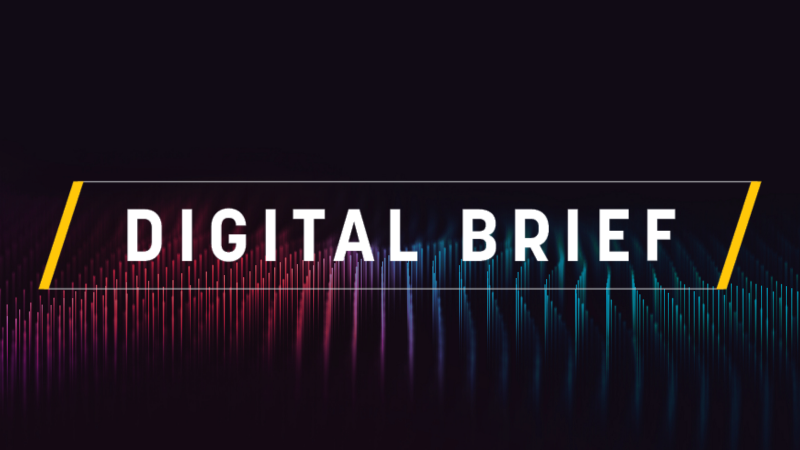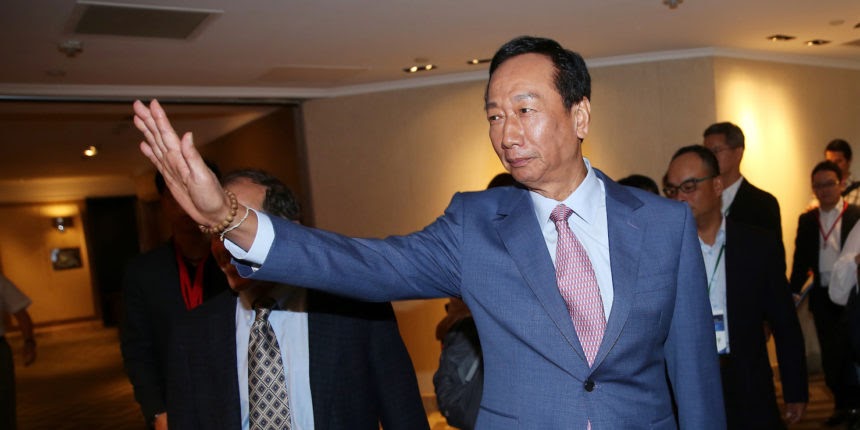
Welcome to EURACTIV’s Digital Brief, your weekly update on all things digital in the EU.You can subscribe to the newsletter here .
“Some actors, such as Google, wish to free themselves from those rules.” – French President Emmanuel Macron, Wednesday 16 October.
FRANCO-GERMAN COPYRIGHT ALLIANCE.We revealed in Tuesday’s edition of The Capitals that Paris had called on Berlin to force Google to respect the spirit of the EU copyright directive, following France’s moves to transpose the right for press publishers to seek remuneration , from the Copyright directive.Yesterday, French and German political leaders met to talk about whether they should take joint action against Google.
Macron came out with some strong words, saying there are some firms, such as Google, that are trying to find a way out of the copyright deal.A joint Franco-German text published following Macron’s meeting with Merkel said the two countries will attempt to ensure “full respect of those [copyright] rules.”
The publishing industry also jumped on board this week, with the German Newspaper Publishers‘ Association (BDZV) and the French Alliance de la Presse d’Information Générale (Alliance) publishing a joint declaration in which they called for the rapid and uniform implementation of the Copyright directive’s neighbouring right for the benefit of press publishers.
COPYRIGHT STAKEHOLDER MEETING.Current Digital Economy and Society Commissioner Mariya Gabriel called for unity this week, opening the first stakeholder dialogue on the Copyright Directive.“We have to get over the divisions of the past,” she said in an attempt to rally the benefits of Article 17, which gives particular platforms the duty to ensure that copyright content is not uploaded to their site.
Specifically in this area, Gabriel said Article 17 “opens a new chapter… [and] brings in a new framework that provides essential safeguards…it’s an approach that is a response to a very specific challenge.” The next round of stakeholder discussions, on November 5, will focus on copyright in the context of the audiovisual, sports, images, prints, and news industries.
BRUSSELS BECOMES BATTLEGROUND… for the latest spat between Chinese telecommunications firm Huawei and the US government, as both sides fought for supremacy in the European capital this week.On Wednesday evening, Huawei went on an EU charm offensive with an event staged at the European parliament – putting their Western chief, Abraham Liu, into the lion’s den.
“Europe’s digital future should be in its own hands,” Liu said, rallying the importance for the bloc to maintain its own digital sovereignty.
Huawei’s Western chief also reaffirmed the company’s support for the recent news that Germany have finalised the details in their so-called security catalogue , which will not bar any specific equipment vendor from involvement in 5G.
CHINA-GERMAN RELATIONS.Indeed, following a series of charm offensives by German political officials in China this year, the two countries are becoming closer and closer ahead of Germany’s Presidency of the EU Council in July 2020.German Chancellor Angela Merkel said on Thursday Germany would make relations with China a priority when the country takes its seat at the top of the EU Council on 1 July.
WASHINGTON PRESSURE.On the US side, pressure on the EU to act against Huawei is unrelenting.Deputy Assistant Secretary of State for Cyber Robert Strayer briefed Brussels reporters earlier this week and repeated the previous US threat to potentially cut information sharing with Berlin, unless Germany ensures that it only works with trusted vendors.This came a day after the news that Germany wouldn’t exclude Huawei (or any other telecoms company specifically) from the country’s 5G infrastructure, unless there was an evidential security risk.
The whole brouhaha doesn’t seem to be impacting Huawei that badly – following the publishing of their Q3 business results, which showed steady increases in profit and a rise in smartphone exports .
Despite Huawei’s business success, there are those who remain sceptical.
Earlier this week, I caught up with Claire Chu, a senior analyst at the Washington based consulting firm, RWR Advisory Group.“Any EU country that decides to use Huawei equipment in its critical telecom infrastructure would be deliberately ignoring all the alarm bells that have been set off by previously documented Chinese state-backed data breaches and network disruptions,” she told me.
HONG KONG.Earlier this week, I met Yik Mo Wong, a senior member of Hong Kong’s pro-democracy Demosisto movement.Mo updated me on the ongoing developments in the city, following prolonged clashes between police and protesters.
Joshua Wong, the poster-boy for the pro-democracy movement in Hong Kong , had previously told me that his group were desperate for Europe to do more to help out.This week, Mo gave me an insight into how the Hong Kong government may be using technology to surveil protestors and highlighted that protestors feel they are being continuously surveilled by way of the use of various technologies, including smart lampposts.
Meanwhile, on Wednesday, Hong Kong’s Chief Executive Carrie Lam said the Technology Talent Admission Scheme (TechTAS) will be developed further in the Hong Kong area.
ONLINE TERRORIST CONTENT.Earlier this week I got wind of the anticipated trialogue timetable for the talks on the controversial online terrorist content regulation.The first round of negotiations takes place today, followed by a second trialogue on 20 November, and a third on 5 December.Technical meetings will also be taking place in between.There are a number of sticky issues with regards to the negotiations.
One such, although the positions of the Council and the Parliament appear close on this, is the minimum timeframe of removal orders – the position of both the Parliament and the Council is to force companies to remove online content promoting terrorism within an hour of receiving an order from national authorities.
MEPs also believe there should be no compulsory use of filters or automated tools.Lobbyists have also started speaking up, too.Yesterday, I caught up with CISPE’s Chairman, Alban Schmutz, representing Europe’s cloud services infrastructure industry – who are aggrieved that their business is caught up in the scope of the regulation.“Obliging cloud infrastructure companies to proactively monitor and filter online content would be asking them to do something technically impossible,” he said.
BREXIT ADVICE.
The EU council still needs to rubberstamp an agreement made today between UK and EU negotiators, but that, of course, doesn’t completely discount the possibility of a no-deal occurring.The UK government has released new advice on making phone calls and sending texts in the case of a no-deal.The government also released recommendations on what relevant service providers should do to comply with the regulations covering the security of network and information systems after Brexit.
LIBRA DRAMA.French Economy Minister Bruno Le Maire wrote an op-ed today in the FT, calling Facebook’s Libra cryptocurrency a “ threat to national sovereignty .” His comments come after it transpired recently that Visa, Mastercard, eBay and Stripe have abandoned their membership of Facebook’s Libra programme, amid mounting concerns in the EU.
Recently, Eric Ducoulombier of the Commission’s DG FISMA told EURACTIV the EU’s executive branch is in the process of formulating a series of questions to address to Facebook ahead of the 2020 launch of Libra.From the Parliament’s side, EPP’s MEP Markus Ferber told EURACTIV he would support an outright ban on Facebook’s Libra plans.
BROADCOM ANTITRUST ORDER .US chipmaker Broadcom has been ordered to halt exclusivity deals with six TV and modem makers for up to three years while EU antitrust enforcers investigate whether these agreements are aimed at thwarting rivals.
UK INVESTIGATES AMAZON DELIVEROO DEAL.The UK’s competition regulator said on Wednesday (16 October) it had launched a formal investigation into Amazon’s investment in food delivery company Deliveroo, setting a Dec.
11 deadline for a decision on the first phase of its probe.
GOOGLE ANTITRUST FINE .In other antitrust news, Google’s fight against a €2.4-billion EU antitrust fine will be played out over three days in February 2020 at Europe’s second-highest court, according to parties involved in the case.
GDPR.Council documents released this week disclose that the working party on information exchange and data protection will next get together on 21 October to start work on the evaluation and review of the GDPR.
***
On my radar.
The International Conference of Data Protection and Privacy Commissioners (ICDPPC) is taking place next week, between the 21st and the 24th October in Tirana, Albania.Lots of interesting data experts will be in attendance – more info on their website here .
What else I’m reading this week:
Europe’s Old Universities Spin Out New Tech Companies (WSJ) Apple Pay Joins Facebook’s Libra on the EU’s Antitrust Radar (Bloomberg) Huawei’s facial recognition technology causes social anxiety in Serbia (SCMP)
Upcoming Events
Cybersecurity represents one of the greatest challenges that companies, individuals, national governments and supranational organisations currently face.The technological devices that citizens use daily could be at risk of potential cyber-threats due to insufficient built-in security safeguards.EURACTIV invites you to a high-level stakeholder Forum on December 10 to discuss the EU’s progress on cybersecurity, the possible future mandatory nature of the Act, and the challenges the new Commission will face..
